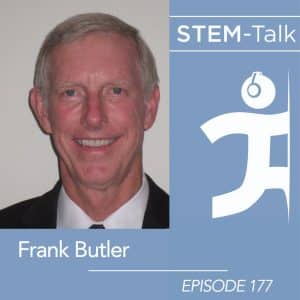STEM-Talk: Frank Butler on revolutionizing combat casualty care
Published 1.16.25
Frank Butler has saved the lives of countless U.S. military servicemembers due in large part to something he saw as a college sophomore.
As a Georgia Institute of Technology student on a Navy ROTC scholarship, Butler was in Virginia in 1969 learning about different aspects of Navy careers.
A helicopter full of Navy SEALs flew over the group of students that included Butler. They dropped from that helicopter over water and staged a demonstration of using explosives to clear a beach for an amphibious assault, “just as they had done in World War II,” he says.
“I was pretty much sold from the moment I saw that demonstration and determined that going into the SEAL teams was what I wanted to do,” Butler says.
It may have delayed his entry into medicine, but these twin tracks would lead Butler down a path that ultimately changed the way battlefield medicine is conducted.
It’s just part of the journey he shares with listeners on Episode 177 of STEM-Talk, available now wherever you listen to podcasts.
An ophthalmologist and a retired Navy Undersea Medical Officer, Butler served as a SEAL platoon commander before he went to medical school.
On Jan. 2, 2025, Butler received the Presidential Citizens Medal from President Joe Biden for introducing Tactical Combat Casualty Care in 1996 to battlefield trauma care, setting new standards for tourniquet use for injuries in war — and ultimately in civilian life.
TCCC is an innovation that revolutionized pre-hospital battlefield trauma care, a field he says had remained largely unchanged for nearly 130 years after the Civil War.
“(That lack of innovation) was a stunning thing to realize,” Butler says.
Even though Butler’s paper on TCCC was published in 1996 in the Journal of Military Medicine, it took time for it to become protocol across the entire military community. In April 1997, Rear Admiral Tom Richards, commander of the Naval Special Warfare Command and leader of the SEAL community, signed a directive mandating TC3 as the standard for battlefield trauma care.
The 75th Ranger Regiment and Delta Force (the U.S. Army’s 1st Special Forces Operational Detachment-Delta) followed shortly afterward, Butler says.
Still, it took more than five years — and the war in Afghanistan following the Sept. 11, 2001, terrorist attacks —for TCCC to become a widely used as a standard of care.
“There were scattered units when 9/11 happened who had TCCC on board, but the vast majority had no idea what TCCC stood for,” Butler says.
They learned — and have saved countless lives since. The conversation includes:
- Butler’s childhood as part of a big Catholic family growing up in Savannah, Ga., playing pickup basketball and reading books from the public library.
- His experience in Basic Underwater Demolition SEALs School, and his transition to Jacksonville Naval Hospital, and the Navy experimental dive unit.
- How he transitioned to medical school, his internship in family medicine, and how he chose ophthalmology as a specialty.
- Projects he worked on as research director for the SEALs, including battlefield trauma care, a tactical athlete program, improved treatment of decompression sickness, and the SEAL nutrition guide, the tactical athlete program.
- His book, “Tell Them Yourself: It’s Not Your Day to Die,” and the 1993 “Black Hawk Down” incident in Mogadishu, Somalia, plus much more.
IHMC is a not-for-profit research institute of the Florida University System where researchers pioneer science and technology aimed at leveraging and extending human capabilities. IHMC researchers and staff collaborate extensively with the government, industry and academia to help develop breakthrough technologies. IHMC research partners have included: DARPA, the National Science Foundation, NASA, Army, Navy, Air Force, National Institutes of Health, IBM, Microsoft, Honda, Boeing, Lockheed, and many others.
Latest News
- STEM-Talk: NASA’s Flawed Plan to Return to the Moon – with Mike Griffin and Lisa Porter
- IHMC partners with Conduit Venture Labs to accelerate commercialization efforts
- Research platforms aim to better support military personnel in high-stress environments
- Study for U.S. Air Force Research Lab tracks impact of ketones on pilot ventilation
- National Institute on Aging funded study tracks changes to gait as we age
- Meet Alex, IHMC’s next generation humanoid robot
- Decades of AI-expertise fuel growth of National Center for Collaborative Autonomy
- Entrepreneurs, researchers find opportunity at Northwest Florida Pitch Day
- IHMC honored by Humanoid Robotics Technology as Outstanding Research Organization

